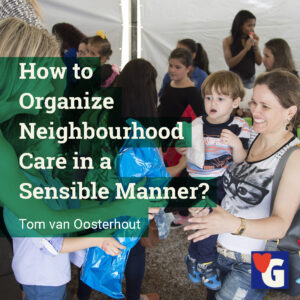
Neighbourhood care is booming in the Netherlands and Germany. More and more citizens participate in social networks in their neighbourhoods to ensure care support.
Such shared support compensates for the rise of social, physical, psychological and cognitive shortcomings when ageing. Neighbourhood care is a clever choice when ageing.
With this type of self-organization, citizens compensate for the shortcomings of ageing and for the shortcomings of public and commercial care services.
Particularly given the current health crisis, these initiatives are more than welcome. However, how to organize neighbourhood care?
Some of the links might be affiliate links. As an affiliate associate, we earn a small commission when you purchase any of the products offered through the shared links at no extra cost for you. This helps us to maintain this website.
Table of contents
Our responsibilities

As ‘customers’ of professional care, we assume a very limited responsibility. Our relation with professional caregivers is simply unequal.
Researchers confirm this and blame the protocols in professional care. There is very little room and time for us, as ‘customers’, to formulate our own specific care needs.
Our personal capacities and wishes are subordinated to the concerns of policies, professionals, and business operations. Research also confirms that we can hardly influence such concerns.
There is also another flaw in our relation with professional caregivers. They rarely contribute to our ability, as caretakers, to remain in control of our own lives. Once winded up in the care system, there is a serious lack of professional confidence in the goals and ambitions of caretakers.
Monumental achievements

Of course, politicians, policymakers and care professionals have no easy job. They have to balance caring, with business operations, and public and political responsibilities. These are certainly not easy tasks. However, often caregivers overlook the significance of the people they work for.
Why should we make a point of all this? There are no countries in the world where the chance of receiving qualified, formal care is higher than in the Netherlands and Germany. Besides, such care generally ends up with the people who most need it.
Moreover, in these countries, the help from the social network (mainly the family) by far exceeds that from the professional network. This is enough reason for politicians, policymakers and professional and family caregivers, to be proud of their achievements. Still neighbourhood care is on the rise.
The neighbours run the show

Neighbourhood assistance, neighbourhood help, neighbourhood support, neighbourhood care. No matter what you call it: the neighbours run the show. Solidarity between the neighbours is central.
To run the show, also means that the neighbours get to work. Some years ago I made an inventory of the type of activities.
They vary a lot and are numerous: from the organization of social contacts and visits to the theatre to mutual social assistance, for instance with shopping and transport services. In the USA there is even a ‘franchise’ like neighbourhood concept, called The Village-to-Village Network.
Some of the neighbourhood initiatives even purchase collective care services or organize care consultancy or advocacy. They fight for the rights of the joint participants. It’s obvious that these activities require substantial efforts from the neighbours.
Related: The Advantages of Co-housing, a Revival of the Village Sentiment
To grow old in your own neighbourhood

It is fascinating to see that the activities the neighbours organize, simultaneously, meet a great variety of needs. Such as the need for self-development, the need for social contact, the need to help others, the need for a sense of community, the need for autonomy, and of course the need for assistance.
Together their joint activities enable neighbours, when they grow older, to live independently. In their own home, in their own neighbourhood, and as long as possible.
Politicians, policymakers, and care professionals, research shows, show no serious interest in these neighbourhood care initiatives. This is expected because they live in their own bubbles and troubles.

Professional care is a closed system. A system that is driven by the concerns of politicians, professionals, and business operations. Of course, overall their efforts contribute to the well-being of the citizens.
In contrast, the joint engagement of the neighbours determines the activities and results of neighbourhood care. It’s as if the differences could not be greater. This is, however, a somewhat misleading idea.
Neighbours are, as much as politicians, policymakers, and professional caregivers, engaged by two opposing dispositions: their own personal concerns and, at the same time, solidarity with others.
Neighbourhood care policy

Professional caregivers exert policies that efficiently and effectively respond to citizens’ care demands as much as possible. This results in a high added value for citizens, and for society as a whole.
Such efficient and effective policies are important. Neighbourhood care initiatives should embrace such policies. However, what could be the aims of such policies. There are various options to mutually add value to a neighbourhood care initiative. Anyway, the first option is to design a care policy.
Some rules of thumb when developing a neighbourhood care policy:
- Start from an inquiry among your neighbours. What are their needs and demands?
- Ask them suggestions on how to satisfy these needs and demands;
- Use the inquiry to recruit volunteers. Explain that volunteers come in all sizes and types;
- Always explain the results of the inquiry to all your neighbours and ask for specific feedback on the results from all neighbours;
- Design policies explicitly based on the results of the inquiry and the feedback received;
- Again ask feedback on the policies designed;
- When presenting the policies suggested, explain to your neighbours that these policies are not sacrosanct. New ideas are always welcome, as well as new activities and new volunteers.
Where all care begins

There are substantial similarities between professional caregivers and the citizens who organize neighbourhood care. They share the same engagement, their own personal concerns and solidarity.
Moreover, there is another quality they share. They all agree on the idea of ‘respectful care’. This moral foundation bridges the gap between neighbours that organize care and professional caregivers.
Neighbours and professionals share respectful care, marked by the following principles:
- They behave mature and with good intentions;
- They appreciate care to have different outcomes;
- They create room for reciprocal decision making.
These principles enable communication and collaboration. As well as between neighbours in their own care initiatives, and between these initiatives and professional caregivers. They have to respect each other’s concerns and independence and, by creating the appropriate room to move, act upon this. This is where all neighbourhood care begins.
How to organize neighbourhood care
Summarizing to organize neighbourhood care, you require:
- Active neighbours, neighbours who take the initiative;
- Neighbours who are willing to share responsibilities with others;
- Neighbours who are goal oriented and share their engagement;
- Focus on support to independently grow old in your neighbourhood;
- Design a shared and engaging neighbourhood care policy;
- Respectful care morals.
When you participate in a neighbourhood care initiative, please let us know. When you need some support to create an initiative, please let us know. The comment box is open to everybody.

Hi Tom,
This is such a great idea that should be learned and practiced by many other countries, especially during the pandemic. When we build a strong support in our neighborhood, the community will grow strong as well. The Netherlands and Germany can be role models in this.
How long does it take if we want to start neighborhood care initiative? Do we invite any stakeholders to join as well? Sometimes in a country like Indonesia, it is difficult to start something like this if we don’t get the local authority involved and then if there’s nothing to be gain with (incentives etc), we will not pass even the planning part. 🙁
Thank you for sharing such a good read. I hope one day I could start this kind of initiative at least in my neighborhood where I grew up (Borneo).
Cheers,
Ferra
Hello Ferra,
Thank you for your compliments.
There are three practical issues you address in your comment: timing, stakeholders and incentives.
Timing: any neighborhood initiative starts when neighbors actually do something together for their own or other peoples benefit. When you assess how people live in your neighborhood you will quickly notice that such initiatives are actually very common. Sometimes someone goes shopping for someone else, or helps in the garden, or with cooking, etcetera. The next step is to organize such activities for those that need help and don’t get it. This needs more cooperation between neighbors and more organization and coordination. It must also be clear whether people actually want to be helped. Sometimes this is not the case. In the West one out six people who are in need of help don’t want it.
Stakeholders: in a neighborhood initiative the only stakeholders are the neighbors. Otherwise it would be something else, for instance a local authority-neighborhood partnership. Of course there is nothing against such a hybrid type of care initiative. The question is what the neighbors want. Authority interference usually tends to change the goals the neighbors care for. As a matter of fact, most authorities tend to overcomplicate such goals. When neighbors care for each other it’s usually concerns simple and direct types of help. Authorities tend to burden neighborhood care initiatives with all kind of professional ideas, which were never solicited by the neighbors. So, when you want to work with local authorities be sure this does not overburden your capacities as neighbors.
Incentives: there are all kind of incentives in neighborhood care. Yet, it is very important that from the start you try together to explicitly express the incentives you want to achieve. This might be very simple, in terms of good mutual feelings (I’m happy when you’re happy), or more complicated as some initiatives in Germany, they give a voucher to people who help others, the voucher entitles you to assistance when you are – most often in the future – in need yourself.
I hope I made some things clear for you.
Lot’s of luck.
Regards, Tom
Hi Tom,
What a wonderful idea and certainly something that is very feasible.
I feel that within certain communities, where people are close and know each other well, that this type of neighbourhood care goes on. And typically without much organisation, but simply as a way to look out for one another.
I’ve personally been doing a neighbour’s shopping for over 5 years now and I regularly pop over for a chat and a cup of tea.
There’s nothing specifically formal about the arrangement, but she is an elderly widow, and her children live in different parts of the country, so she doesn’t get to see them that often.
I did also end up doing regular shopping trips for some of my other elderly neighbours during lockdown, and checking in on them to make sure everything was okay, but nothing more.
I really like the idea of actually having something a little more formal and organised within the community, and it’s definitely something that we should all aim to do.
With that said, I’m aware that this type of strcture may not always work, as many people like to keep themselves to themselves.
I’m not sure if this is just symptomatic in the UK, or whether it happens in other parts of the world, but I definitely have neighbours who have lived within a few yards of me for over 10 years, and we barely say hello to each other.
I guess it’s all relative.
A great read Tom and a very inspirational cause.
Partha
Hello Partha,
Let me first commend you on the assistance you give to your neighbors. Your behavior is what neighborhood care is all about. Thank you also for your compliments.
Although neighborhood care is primarily informal, it is surely worth while to consider upgrading it to some formal status. That this requires some effort to keep a certain amount of informality and spontaneity alive, which is so characteristic for neighborhood care, I guess is obvious.
In my view one way to formalize neighborhood care is to establish a voluntary, or neighborhood, care association. Such associations are not uncommon in the UK. They even can get some legal distinction. Such legal status, as far as I remember, comes even with some tax advantages.
One of the most important issues with a voluntary care association is that as much neighbors as possible participate, participate actively, and share responsibility for the performance of the association. Not only in an institutional sense (financing, governance, rules and regulations), but foremost in regard to personal engagement of the participants and the organization of provisions.
“People like to keep themselves to themselves”, that is true for most Western countries, or even more in general, countries that are a sophisticated welfare state. In bypassing some theoretical notions, individualism comes with the conviction that the state will care for you, no matter what.
In my view the welfare state is one of the few admirable and fortunate collective achievements of man-/womankind. However, as with a neighborhood care association, when participants do nothing, nothing will be achieved. So, in the end, it’s all about the balance between individual efforts and investments to collective benefits. The more individuals invest in each other the bigger the collective benefits.
Please continue to assist your neighbors, and good luck with your efforts to improve your neighborhood.
Regards, Tom
I really enjoyed reading your post. I do agree that we should take care of the elderly as they have done the same. I am the first person that organized a neighbourhood care in our community and people loved it and supported it. (so proud of myself)
Everyone has at least an hour or two to participate in such an event and I encourage everyone to try it out once in a while. I don’t know about you, but the feeling I have inside of me once I help an older person is beyond what words can describe. <3
Hello Gorjan,
You’re totally right to be proud of yourself and to savor the good feelings that result from the help you give others.
From the substantial research I did into neighborhood care associations, I understood that for those that receive assistance it is always important to be able to do something in return. Many elderly people are very willing and often even very capable of giving some assistance back. What are your experiences with them?
Anyway, thank you for your compliments on my article.
Regards, Tom
This is one of the greatest ideas I have heard of for a neighborhood. Our elders are all around us and should be instead of stuck in a home and getting mistreated at times by the workers. Why not have the neighbors look after the elder, afterall they will need it some day themselves.
I do a lot of work in my neighborhood for those that can’t afford the expensive serves in the local area. It gives me great plearsure to talk to the neighbors and be able to help them out. Perhaps society has grown up to be too depended on our system to take care of us, I don’t know but there is one thing for sure, the system is failing and we best do something about it now before it’s too late.
Family is usually the ones that come and take care of the elder but that is not always the case. Sometimes they may not have any family left to take care of them or they have fallen out which I have seen plenty of times.
I think we need this type of neighborhood care in our communities. That is fantastic that it is booming in your area. We need to stop depending on the Government to take care of the elderly for us. It costs way too much when the government gets involved and they tend to over complicated matters. Some things is best left with the Government but I am sure the community can help with the majority of the time.
Thank you so much Tom for all the ideas in getting started on a neighborhood care.
Thank you so much for your compliments Rick.
You probably noticed I got a lot of pleasure out of writing this article.
The complicated issue with the welfare state is that the state cannot be everywhere all of the time. Most of us do not even appreciate a state that is everywhere all of the time. We all cherish our independence. Although some of us tend to forget that our independence profoundly depends on the provisions of the welfare state (education, social income guarantees, health care, to name just a few).
It is also very important not to forget how important independence is for the elderly. Any effort invested in the motivation of the elderly to participate in neighborhood care, as caregivers and as caretakers, is an investment that pays off. In the short run for them and in the long run for those that wish to live as long as possible in their own neighborhood.
Lot’s of luck with all your good work.
Regards, Tom
In the very old times, when I was a little girl, we lived in a way that at least the nearest few streets’ tenants knew each other. I do remember that my parents used to regularly visit a few older neighbours and helped with the tasks that were too difficult for them, or helped when they were ill. The same was in other families.
We, as children were usually sent to run errands for the elderly. Either to do some shopping, or get the letter to the post box (in those times…) or feed the dog or something.
Someone had a car, that person was there whenever a transport was needed, several people did all the snow shovelling for the elderly in the neighbourhood and someone took care of minor repairs that they needed and so on.
There were no caring homes in those times, so if the children were not around for whatever reason, the neighbours organised themselves to provide a proper care for an elderly neighbour.
There was even a saying that you need to cherish and respect your neighbour more than any of your relatives…Those were the times when you could totally rely on your neighbours and it worked very well.
Here, in UK, I see that only in my immediate surrounding, as I do it for our 96 years old neighbour and, on the other side, there is a young couple next to us, who very often pop in asking whether we needed something. But, I do not think the neighbours are that close everywhere.
However, there are charities, at least in UK that function by the similar principles and their volunteers are mostly as devoted and committed to the idea of the well-being of elderly, as the professional, long-term carers themselves. That said, the fact is, that not everyone feels comfortable receiving something from a charity, even if it’s a small help.
On the other hand, you are quite right, the professional caring is insufficient today, mostly because of the lack of carers, which is caused again by various reasons, starting with a high lack of respect for their work in the governmental circles, low wages, public health care policy and so on…
I totally agree that a form of additional care for our elderly is more than welcome and the idea of a well organised neighbourhood care is probably the best addition that may ensure peace of mind for many, as well as actual, practical, real, and quick help.
Putting together such a project requires a lot of effort, determination, time and work, but a person that would undertake such a task is sure to be well guided by your article.
Thank you very much for your compliments, Kerryanne.
Your historical analysis applies to many Western countries. More specifically the urbanized areas.
The interesting thing though is that when you ask people whether they would like to help somebody, they usually say “Yes, what can I do?” The willingness to help is widespread.
There are several obstacles to transfer this positive attitude into practice:
– There is possibly a mismatch between supply and demand;
– People who need help, don’t ask for it;
– People who need help, don’t know they do;
– People who need help, don’t know who to go to;
– People who need help, don’t want to be helped.
These obstacles are attributed to our ingrained mentality of independence. We must help ourselves. Vitality is appreciated, imperfections and impairments are not. People also think that if somebody helps them, they have to reciprocate the given assistance.
Specifically when people grow older they cherish their independence. It’s interesting though that they use this independence to sustain as much meaningful social contacts as possible. This urge is the best portal to win over people to ask for assistance.
This is were neighborhood care starts. Organize possibilities for social contacts. This can be done very simple by inviting people for tea or a drink. Or by organizing community activities, for instance for children. Block the street and organize an outdoor get together (a bit awkward at the moment, however, who knows, perhaps it opens a totally new perspective on the virus?).
One of the most intriguing ways to try to motivate older people, is by inviting them to assist at neighborhood help. Explain you need them to help others. When well prepared and thought through, this works like amazing.
A final remark. You state, “a person that would undertake such a task”. In my view, to organize neighborhood care on a more long-term footage, this never can be and never must be ‘a one person’ job. That is impossible, and it doesn’t make much sense. Why call it neighborhood care when it’s a one person initiative?
Lot’s of luck with all the good work you do.
Regards, Tom
Hey Tom,
I really like this article and I love the idea of neighborhood care. During these very tough times with Covid-19 and people having to stay home, which is coming back here in the UK. People are going to find it even tougher with loneliness, mental health issues and not having the help of others. So neighborhood care will go a long way with people who are on their own and in need of others. No matter if you’re in your 20’s or in your 70’s, neighborhood care can help anyone and I love that.
Thank you for sharing such an inspirational article and idea. Keep up the amazing work.
All the best,
Tom
Hello Tom.
Thank you very much for all your compliments.
You hit the nail right on its head by stating that neighborhood care can help anyone, no matter what their age is. It’s also the other way around, any person, of any age, can help somebody else.
The challenge for neighbors is to step across the threshold and join hands. It’s so important to support each other, not just to help somebody, but also to assist each other to help. There are so many unnecessary pitfalls. By sharing experiences, caregivers already support each other tremendously.
One of the issues not addressed yet, is the very vulnerable relation between informal and formal care. This is were mutual support between caregivers in neighborhoods is of so much importance. And organize lines of communication between organized, but informal, neighborhood care and professional care. Preferably unrelated to specific cases. Just to get to know and respect each other.
Regards,
Tom